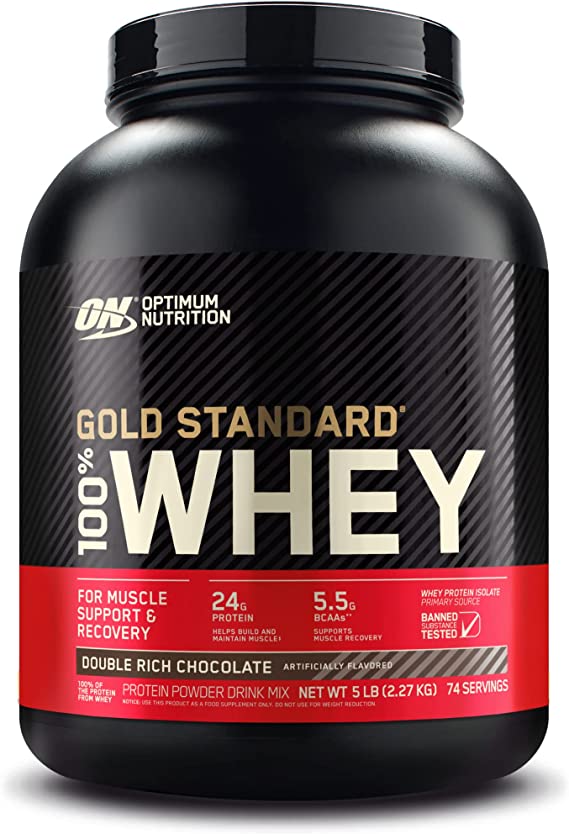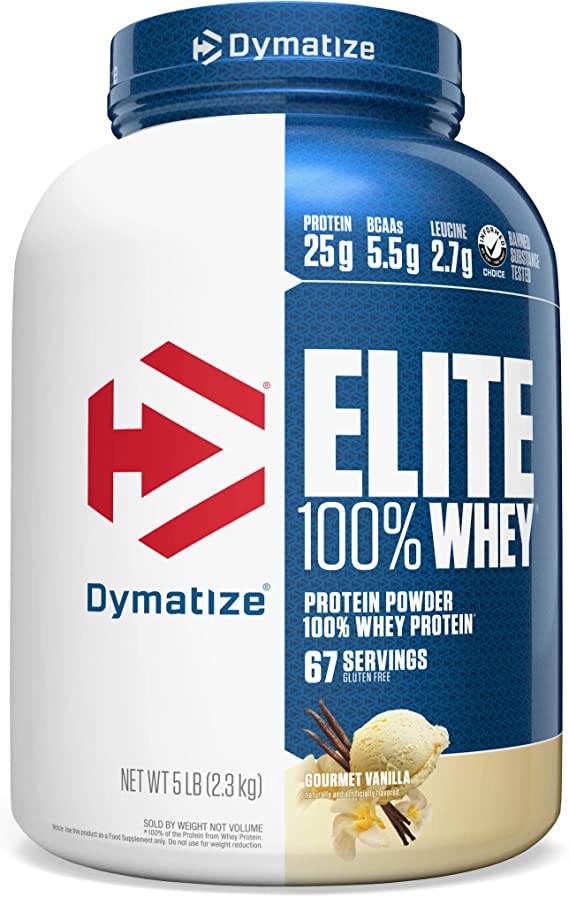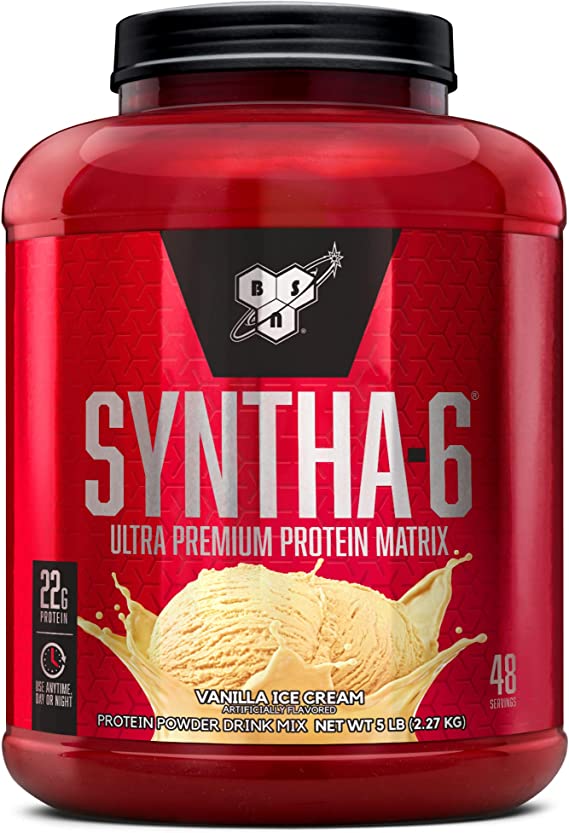Protein is an essential nutrient for muscle growth and repair. When you engage in regular exercise, your body requires an increased amount of protein to support the development of lean muscle mass. In this article, we will discuss the importance of daily protein intake for muscle growth and provide you with practical guidelines to optimize your protein consumption for maximum results.
1. Introduction
If you’re looking to build and maintain muscle, understanding the role of protein in your diet is crucial. Protein serves as the building blocks for muscle tissue and aids in muscle recovery after intense workouts. To achieve optimal muscle growth, it’s essential to consume an adequate amount of protein on a daily basis.

Optimum Nutrition Gold Standard 100% Whey Protein Powder, Double Rich Chocolate, 5 Pound (Packaging May Vary)
2. Understanding Protein and Muscle Growth
Muscles are made up of protein fibers, and when you engage in resistance training or other forms of exercise, you create microscopic damage to these fibers. To repair and rebuild the muscle tissues, your body requires protein. Protein provides the necessary amino acids that facilitate muscle recovery, growth, and adaptation to exercise.
3. Protein Requirements for Muscle Growth
3.1. Protein Intake Recommendations
The recommended daily protein intake for muscle growth varies depending on factors such as your weight, activity level, and goals. As a general guideline, individuals looking to build muscle should aim for a protein intake of approximately 0.7 to 1 gram of protein per pound of body weight (or 1.6 to 2.2 grams per kilogram). This range ensures that you provide your body with enough protein to support muscle repair and growth.
3.2. Timing of Protein Consumption
Distributing your protein intake throughout the day is important for optimizing muscle protein synthesis. It is suggested to consume protein-rich meals or snacks every 3-4 hours. This frequent protein intake ensures a steady supply of amino acids for your muscles, promoting muscle recovery and growth.
3.3. Protein Quality
The quality of protein you consume also plays a significant role in muscle growth. Complete protein sources, such as those found in animal products like lean meats, fish, eggs, and dairy, provide all the essential amino acids your body needs. However, plant-based protein sources like legumes, tofu, quinoa, and tempeh can also be combined to create complete protein profiles.

Body Fortress Super Advanced Whey Protein Powder, Chocolate, Immune Support (1), Vitamins C & D Plus Zinc, 1.78 lbs
4. Sources of Protein for Muscle Growth
4.1. Animal-Based Proteins
Animal-based proteins are rich in essential amino acids and are highly bioavailable, meaning they are easily absorbed and utilized by the body. Incorporating lean meats like chicken, turkey, and beef, as well as fish, eggs, and dairy products, into your diet can provide high-quality protein for muscle growth.
4.2. Plant-Based Proteins
Plant-based proteins are excellent options for individuals following a vegetarian or vegan diet or those looking to diversify their protein sources. While plant-based proteins may not contain all the essential amino acids on their own, combining different plant protein sources can create complete protein profiles. Some examples of plant-based protein sources include legumes (such as beans, lentils, and chickpeas), tofu, tempeh, quinoa, chia seeds, hemp seeds, and spinach.
5. Combining Protein with Other Nutrients
To optimize muscle growth, it’s important to pair protein intake with other essential nutrients. Carbohydrates provide the necessary energy for workouts and aid in muscle recovery. Healthy fats, such as those found in avocados, nuts, and olive oil, support hormone production and overall cellular health. Including a balanced combination of protein, carbohydrates, and healthy fats in your meals and snacks can enhance muscle growth and optimize your overall nutrition.

Dymatize Elite 100% Whey Protein Powder, 25g Protein, 5.5g BCAAs & 2.7g L-Leucine, Quick Absorbing & Fast Digesting for Optimal Muscle Recovery, Gourmet, 5 Pound Vanilla 80 Ounce
6. Common Myths about Protein and Muscle Growth
There are several misconceptions surrounding protein intake and muscle growth. Let’s debunk a few common myths:
- Myth 1: Consuming excessive protein leads to more muscle growth.
- Truth: While protein is essential for muscle growth, consuming excessive amounts does not necessarily result in more muscle. The body has a limit to how much protein it can effectively utilize. Aim for the recommended protein intake range mentioned earlier for optimal results.
- Myth 2: You must consume protein immediately after a workout for muscle growth.
- Truth: While post-workout protein consumption is beneficial, your overall daily protein intake matters more. Focus on meeting your protein requirements throughout the day rather than solely relying on post-workout protein shakes or meals.
7. Benefits of Sufficient Protein Intake
Ensuring an adequate protein intake offers several benefits for muscle growth and overall health:
- Promotes muscle repair and growth: Protein provides the necessary building blocks for repairing and building muscle tissues.
- Increases muscle strength: By supporting muscle growth, protein consumption can enhance muscle strength and endurance.
- Aids in weight management: Protein is highly satiating, meaning it keeps you feeling fuller for longer, potentially reducing overall calorie intake and supporting weight management goals.
- Supports recovery: Protein consumption after exercise helps reduce muscle soreness and facilitates faster recovery.

Animal Whey Isolate Whey Protein Powder – Isolate Loaded for Post Workout and Recovery – Low Sugar with Highly Digestible Whey Isolate Protein – Vanilla – 4 Pound
8. Risks of Inadequate Protein Intake
Insufficient protein intake can hinder muscle growth and impact overall health:
- Slower muscle recovery: Without enough protein, your muscles may take longer to recover from workouts, leading to potential performance plateaus.
- Muscle loss: Inadequate protein consumption may result in muscle loss, making it difficult to achieve your desired muscle growth goals.
- Weaker immune system: Protein is crucial for maintaining a healthy immune system. Inadequate protein intake can compromise immune function.
9. Conclusion
In conclusion, daily protein intake plays a vital role in muscle growth and development. By consuming an appropriate amount of high-quality protein and distributing it throughout the day, you provide your body with the necessary amino acids to support muscle repair and growth. Remember to include a variety of protein sources in your diet, both animal-based and plant-based, and combine protein intake with other essential nutrients for optimal results. Prioritize meeting your individual protein requirements based on your weight, activity level, and goals to maximize the benefits of protein for muscle growth.

Whey Protein Powder|MuscleTech Nitro-Tech Whey Protein Isolate & Peptides|Protein + Creatine for Muscle Gain | Muscle Builder for Men & Women | Sports Nutrition | Cookies and Cream, 4lb (40 Servings
10. FAQs (Frequently Asked Questions) (Continued)
How soon after a workout should I consume protein for muscle growth?
It is generally recommended to consume protein within 1-2 hours after your workout to aid in muscle recovery and growth. However, the overall daily protein intake matters more than the exact timing of post-workout protein consumption. Focus on meeting your protein requirements throughout the day.
Can I get enough protein from a vegetarian or vegan diet for muscle growth?
Yes, it is possible to meet your protein needs for muscle growth on a vegetarian or vegan diet. While animal-based proteins are complete protein sources, combining different plant-based protein sources can provide all the essential amino acids required for muscle development. Incorporate legumes, tofu, tempeh, quinoa, and other plant-based protein sources into your meals to ensure an adequate protein intake.
Can consuming too much protein be harmful to my health?
Consuming excessive amounts of protein can put strain on your kidneys and may lead to dehydration. It’s important to stay within the recommended protein intake range based on your weight, activity level, and goals. Consult with a healthcare professional or registered dietitian for personalized guidance.
Can protein supplements help with muscle growth?
Protein supplements, such as protein powders or shakes, can be a convenient way to increase protein intake, especially for individuals with higher protein requirements or those who struggle to meet their needs through whole foods alone. However, it’s important to remember that supplements should complement a balanced diet rather than replace it.
How can I incorporate protein into my meals and snacks?
There are many delicious and nutritious ways to include protein in your diet. Some ideas include adding lean meats, fish, or plant-based proteins to your main meals, incorporating Greek yogurt or cottage cheese into snacks, and using protein-rich ingredients like nuts, seeds, or protein powder in smoothies.
Incorporating an adequate amount of protein into your daily diet is essential for muscle growth and development. By understanding your protein requirements, choosing high-quality protein sources, and distributing your protein intake throughout the day, you can optimize your muscle-building potential. Remember to consult with a healthcare professional or registered dietitian to determine the specific protein needs that align with your individual goals and circumstances.

BSN SYNTHA-6 Whey Protein Powder with Micellar Casein, Milk Protein Isolate Powder, Vanilla Ice Cream, 48 Servings (Packaging May Vary)
